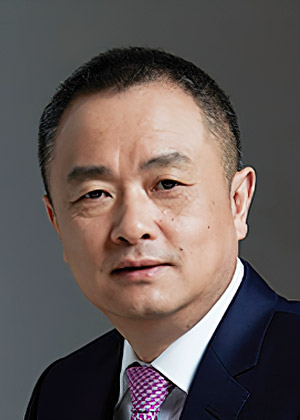
Information Sciences

Hong Mei
Theory, Methodology and Application of Software Architecture Modeling for Internetware
Abstract:The development of Internet towards a global ubiquitous computing platform brings grand challenges to software theories, methodologies, and technologies. The inherently open, dynamic, and hard-to-control nature of the Internet platform exhibits new characteristics on software in various aspects such as basic forms, behavioral features, development methods, runtime mechanisms, and quality assurance. Chinese researchers took the lead in systematically investigating the Internet computing from the perspective of software technology, and proposed a new software paradigm, namely Internetware, in 2000, in order to provide an effective solution for developing and running applications on the Internet platform.
With the substantial research and practice in the past decades, this project has made the following achievements. 1) This project revealed the multi-stage complexity association of high-level structure of Internetware, and proposed the concept and methodology of the whole life-cycle software architecture (SA) and the Architecture-Based Component Composition (ABC) as the supporting approach. In ABC approach, the core artifacts of every single phase of software lifecycle are unified into the SA models and then the iterative refinements and transformations of SA models become the core activities in the whole software lifecycle. In this way, the efficiency and quality of software construction and evolution would be greatly improved. 2) This project revealed the mechanism and properties of the system runtime architecture of Internetware, and proposed the concept of Runtime Software Architecture (RSA), expanding the SA models from the development phase to the runtime phase based on bidirectional model transformation and automated code generation. This project revealed the reverse traceability among system design, implementation and operation, and proposed an SA model recovery method based on analysis of program, documents, and runtime data. 3) A client-driven computational reflection mechanism is invented to reconstruct, monitor, analyze and control the RSA models of a client-server software system in an online and automated manner. A code generation method is also invented to generate the source code of interoperability interfaces from the RSA models in a human-computer collaborative manner, with a code generation rate of over 95%. 4) This project provides a new solution to achieve data interoperability among legacy information systems for data-centric applications. The data-access services can be automatically generated without the need of source code, databases, or documents of legacy systems. The efficiency of data opening of information silo systems has been improved by an average of two orders of magnitude, substantially subverting the traditional “white box” interoperability solution. The system platform and tools developed by this project have been widely used in several major projects and tasks of the national big data strategy in China. The related technologies have been adopted by the standards of the Digital Object Architecture.
 Awardee:Hong Mei was born in May 1963 in Guizhou Province. He is a Member of Chinese Academy of Sciences, a Fellow of the World Academy of Sciences: for the advancement of science in developing countries, a Foreign Member of Academia Europaea, and a Fellow of the IEEE. He received his bachelor degree in 1984 and master degree in 1987, both from Nanjing University of Aeronautics and Astronautics. In 1992, he received his PhD degree from Shanghai Jiao Tong University. In the same year, he joined Peking University as a post-doctoral researcher. Since then, he successively served as a lecturer, an associate researcher, and a professor in Peking University. He ever served as a vice dean and the dean of School of Electronics Engineering and Computer Science of Peking University, a vice president of Shanghai Jiao Tong University, a vice president and executive vice president of Beijing Institute of Technology. He is currently a vice president of the Academy of Military Sciences, the director of Key Lab of High Confidence Software Technologies (Peking University), Ministry of Education, and the president of China Computer Federation.
Awardee:Hong Mei was born in May 1963 in Guizhou Province. He is a Member of Chinese Academy of Sciences, a Fellow of the World Academy of Sciences: for the advancement of science in developing countries, a Foreign Member of Academia Europaea, and a Fellow of the IEEE. He received his bachelor degree in 1984 and master degree in 1987, both from Nanjing University of Aeronautics and Astronautics. In 1992, he received his PhD degree from Shanghai Jiao Tong University. In the same year, he joined Peking University as a post-doctoral researcher. Since then, he successively served as a lecturer, an associate researcher, and a professor in Peking University. He ever served as a vice dean and the dean of School of Electronics Engineering and Computer Science of Peking University, a vice president of Shanghai Jiao Tong University, a vice president and executive vice president of Beijing Institute of Technology. He is currently a vice president of the Academy of Military Sciences, the director of Key Lab of High Confidence Software Technologies (Peking University), Ministry of Education, and the president of China Computer Federation. Prof. Mei’s major research interests fall in software engineering and system software, where he has achieved a series of accomplishments in terms of software architecture and component-based software engineering. He acted as a chief scientist of National Basic Research Program (973 Program) of China and a chief scientist of the National Science Fund for Creative Research Groups of China. Prof. Mei has received a number of awards and honors, including the first prize and the second prize of State Technological Invention Award, the second prize of State Natural Science Award, the second prize of State Scientific and Technological Progress Award, National Award for Distinguished Post-doctoral Researchers in China, National Science Fund for Distinguished Young Scholars of China, China Youth Science and Technology Award, HO LEUNG HO LEE FOUNDATION Prize for Scientific and Technological Progress and IEEE Computer Society Technical Achievement Award, etc.
 Awardee:Gang Huang was born in October 1975 in Hunan province. He received his bachelor degree in 1997 and master degree in 2000, both from Northwestern Polytechnical University. In 2003, he received his PhD degree from Peking University. From 2004 till now, he has successively served as a lecturer, an associate professor, and a professor in Peking University. He is currently a vice director of Institute for Artificial Intelligence at Peking University, and the chief scientist of Advanced Institute of Big Data, Beijing.
Awardee:Gang Huang was born in October 1975 in Hunan province. He received his bachelor degree in 1997 and master degree in 2000, both from Northwestern Polytechnical University. In 2003, he received his PhD degree from Peking University. From 2004 till now, he has successively served as a lecturer, an associate professor, and a professor in Peking University. He is currently a vice director of Institute for Artificial Intelligence at Peking University, and the chief scientist of Advanced Institute of Big Data, Beijing. Prof. Huang is long engaged in the research and teaching of system software. He focused on the self-adaptive software technologies and systems, and his achievements have been widely used in Cloud Computing, Big Data, Internet of Data, and so on. He has published more than 100 referred papers and received a dozen of paper awards of international journals and conferences. He acted as the Chinese side principal investigator of the software joint research project of the National Natural Science Foundation of China (NSFC) and the US National Science Foundation (NSF) and the Chinese member of the general assembly of the large-scale integrating project of EU 7th Framework Programme (FP7). Prof. Huang has received several awards and honors, including the first prize and the second prize of State Technological Invention Award, the second prize of State Natural Science Award, National Science Fund for Distinguished Young Scholars of China, National High-Level Talents Special Support Program, China Youth Science and Technology Award, National Excellent Doctoral Dissertation Award, CCF CS Young Computer Scientist Award, and Xplorer Prize, etc.